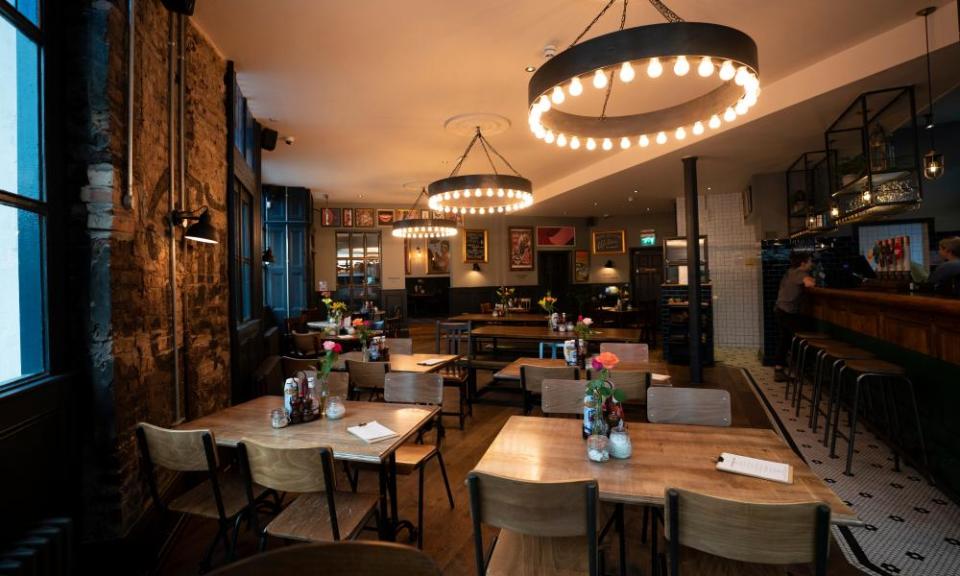How restaurants are scrambling to reinvent themselves in the wake of coronavirus

Financially, it is a sticking plaster. A non-profit way, as one restaurant operator put it to me – as he hurriedly tried to set up a delivery kitchen in a suburban rugby club – of generating some cashflow to cover staff wages and lay off as few people as possible. Nonetheless, the manner in which so many British food and drink businesses have reinvented themselves in the last week, as Friday’s eventual formal shutdown became an inevitability, has been an incredible feat of energy and ingenuity.
Bars and restaurants are now takeaways, bottle shops, delicatessens. Others are selling hampers, fresh meal-kits or offering cookery courses. In West Yorkshire, the Moorcock, previously known for envelope-pushing new-Nordic cuisine, is launching a wood-fired pizza and ice-cream takeaway. There is now a gin’n’beer drive-through in Salford, a sentence I’ve been waiting all my life to write. In London, Cheese Bar’s truck is delivering the ultimate in middle-class outreach: “self-isolation survival kits” of cheese and wine.
Delivery brands may see coronavirus as an opportunity to embed themselves in our lives, making it a universal habit
Others are pushing (discounted) meal vouchers and pay-now-drink-later bar tabs – anything to stay afloat. But, naturally, with lockdowns looming, the biggest change has been restaurants reopening as takeaways and ramping-up delivery. In creative ways, too. London restaurant Bistrotheque has “Greek drag sensation A Man To Pet” bike-couriering its food around to home customers.
If the chancellor Rishi Sunak’s attempts last week to support hospitality were too little, too muddled, too late, the government has acted swiftly to enable this gear-shift. Last Wednesday, it announced the usual change-of-use planning permission for takeaway operations would be waived for 12 months.
However, delivery companies enjoying a sudden spike in sales, such as Deliveroo, Just Eat and Uber Eats, have been less helpful. Despite a growing clamour for delivery companies to drop their £300 to £500 sign-on fees and cut the commission they charge restaurants on each delivery sale (typically, 25% to 35%), there has been little movement.
Current initiatives look more like an attempt to boost revenues and market share for the major delivery companies, rather than genuine help for sinking restaurants. In the US, Uber Eats has waived delivery fees for over 100,000 independents (its UK arm introduced a similar delivery fee cut on Friday, until 31 March). But, primarily, that benefits the customer. Those same restaurants will still have to pay a per-sale commission to Uber Eats which, many restaurateurs argue, slashes their profit margin to almost nothing. “Most of us run at a loss to operate delivery but we do so [for] our loyal customers,” Australian burger chain Milky Lane wrote on Facebook, as it pleaded with the delivery brands to slash their post-coronavirus commissions.
Instead, in Australia, Uber Eats pledged to spend $AUS5m helping restaurants “deploy promotions”, presumably on its own app. US services DoorDash and Caviar have dropped sign-on fees and offered a 30-day commission holiday, but, like Uber Eats’ waiving of initial fees in Australia and the UK, only for new restaurants. That is a land-grab, not a lifeline. Just Eat’s decision last week to waive sign-on fees for new restaurants, offer independents a 33% rebate on delivery commission charges and temporarily scrap its 14% charge for processing orders for collection is marginally better. But it is limited for 30 days. That is not nearly enough for desperate restaurateurs. “Why not come in at half their standard rates,” one asked, rhetorically, “and, if we’re still in business in six months, let’s have an adult conversation.”
This problem predates the pandemic. Like most disruptive tech, delivery companies inserted themselves between restaurants and their pre-existing customer base, and are now charging restaurants to access what, without irony, they describe as an exciting new market. That market, restaurateurs grumble, is not new. They built it. Delivery firms were stealing it from under them slowly and surely by dissuading more and more people from eating out. Worse, while it may have benefited a few specific styles of restaurant, the delivery companies have created a distribution channel which most restaurants cannot ignore, but which many claim they cannot make a viable profit margin from. “It’s horseshit,” US restaurateurs told Food & Wine. “It’s highway robbery.”
Related: Coronavirus has exposed a desperate need for localism | Simon Jenkins
Growing fast but struggling to turn a profit (in 2018, Deliveroo lost £232m), delivery brands may see coronavirus as an opportunity to embed themselves in our lives, making home delivery a universal habit. It is a convenient but ultimately damaging one. Is the growth of delivery providing stable, dignified work for riders? Is it driving food quality? Is it creating a more secure restaurant business model? No, no, no.
Trapped in the house right now, you may feel you need delivery. It existed before Deliveroo, and there is a clear and continuing social need for it, but not on this model. When this crisis is over, please delete those apps. Visit a physical restaurant or, if you want takeaway, order it and if possible collect it yourself, so the restaurant retains the full sale. Give your money to the people currently battling to save this industry – not its new layer of predatory middlemen.
• Tony Naylor is a Manchester-based food writer

 Yahoo Finance
Yahoo Finance 